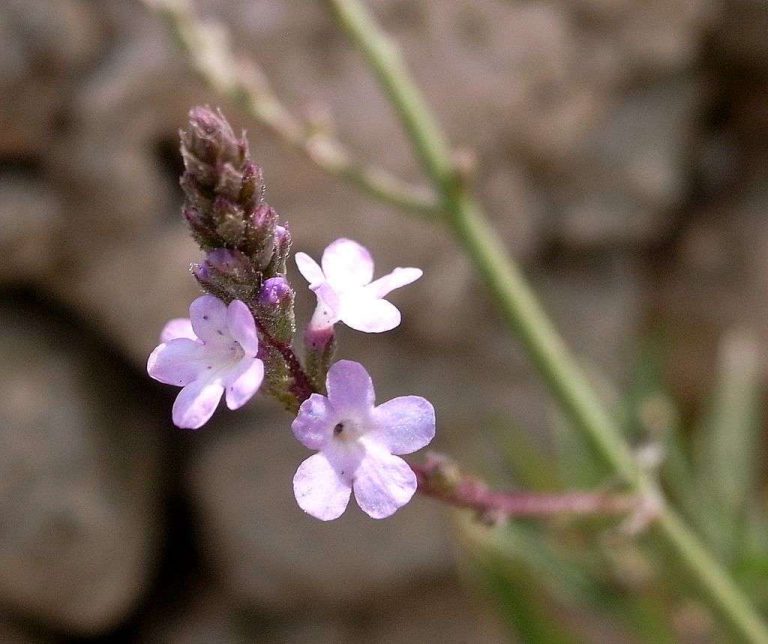Vervain
Common Vervain – The Herb of Enchantment, has been long been associated with divine and other supernatural forces.
It has an equally long-standing use as a medicinal plant being used for its soporific effects in much the same way as the better known Valerian and it is often used as an herbal remedy for women’s health issues.
Latin Name: Verbena Officinalis L.
Plant Family: Verbenaceae – Verbena family
Common Names: Common Vervain, Common Verbena, Herb of Grace, Herbe Sacrée, Herba Veneris, Holy Herb, Herb of Enchantment, Druids Herb, Wizards Herb, Simpler’s Joy, Tears of Isis.
Description: Vervain is an herbaceous perennial herb native to Europe and north Africa which can also be found growing in China. It grows to a height of 90-100cm, the plant has woody stalks and light green stems which are square and are tinged red on the edges. The leaves are opposite, lanceolate, mid-green in colour and deeply lobed. The 5-petaled, hermaphrodite flowers are small, pale lilac to white in colour on slender, erect, compact spikes.
History:
- The Egyptians dedicated vervain to Isis
- The Romans dedicated it to the Goddess Juno & considered it to be sacred.
- Dioscorides in the 1st century A.D. also considered vervain to be a sacred herb and recommended it for treating agues.
- The Druids included it in their ‘lustral water’.
- Magicians & sorcerers used it in many rites and incantations.
- The Physicians of Myddfai in the 13thcentury recommended its use as a treatment for scrofula.
- Culpeper concurred with Dioscorides saying ’it is excellent against venomous bites, and tertian and quartan agues’.
Traditional Uses:
Purification & Protection: Vervain has a long history of use for purification & protection;
- King Solomon cleansed the Temple with vervain
- The Romans placed it on altars in honor of Venus and Diana
- A lustral water can be made from vervain for purifying ritual tools
- A bath with vervain can help the bather prepare for ritual work
- In the British Isles, people held vervain over the Beltane fire to protect their livestock and strewed it over their fields at Summer Solstice to make sure they would be fertile.
- Roman soldiers carried vervain with them into battle
- Homes have been sprinkled with an infusion of vervain to keep out evil, it can also be burned as an incense for this purpose
- In the old Language of Flowers, vervain stood for enchantment and still is very important in various aspects of magic
- Drinking the tea is said to help in astral work and divination
- You can make an oil to anoint the Third Eye by macerating this herb in olive oil.
- Held in high esteem since classical antiquity, Common Vervain has been long been associated with divine and other supernatural forces.
Usage & Benefits:
- The active constituents of this plant are the glycosides verbenalin and aucubin, as well as volatile oil. It is the most common species of all the Verbenas used in herbal remedies with a long-standing use as a medicinal plant.
- Vervain is used for its soporific effects in much the same way as the better known Valerian. It is thought to affect the parasympathetic nervous system and therefore serves as a restorative and recuperative function, strengthening the nervous system whilst relaxing tension and stress. Its relaxant properties also aid insomnia, anxiety, irritability and even depression.
- Vervain is often used as an herbal remedy for women’s health issues. This herb has been prescribed post-pregnancy in order to enhance lactation as well as to stimulate contraction of the uterus and it is often used during labour.
- The analgesic effects of it may counter headaches and abdominal pain associated with menstruation and as it is considered a natural antispasmodic, it is used to reduce menstrual cramping.
- As Vervain has an abortifacient action it should be avoided during pregnancy.
- The tannins in Vervain make it an astringent and therefore useful as a mouthwash for bleeding gums, halitosis, tonsillitis and mouth ulcers. One of its traditional uses includes chewing the roots to strengthen teeth and gums.
- As a poultice or ointment, Vervain provides a natural remedy to alleviate bruises & sprains, skin infections, insect bites, eczema, and other skin disorders.
- Verbena is used on the European Continent for liver conditions, jaundice and gallstones, and as a gentle but effective laxative.
GDPR Compliant
Vervain is listed as having the following Properties:
- Astringent
- Diaphoretic
- Antispasmodic
- Galactagogue
- Febrifuge
Cautions:
There are no reported side effects of Vervain – although its use should be avoided in pregnancy as it may cause miscarriage and it is thought that due to its purgative effects, excess dosages may lead to vomiting. As with all substances those with medical conditions should seek the advice of their doctor before trying.
You can purchase Vervain on The Herbal Apothecary.
